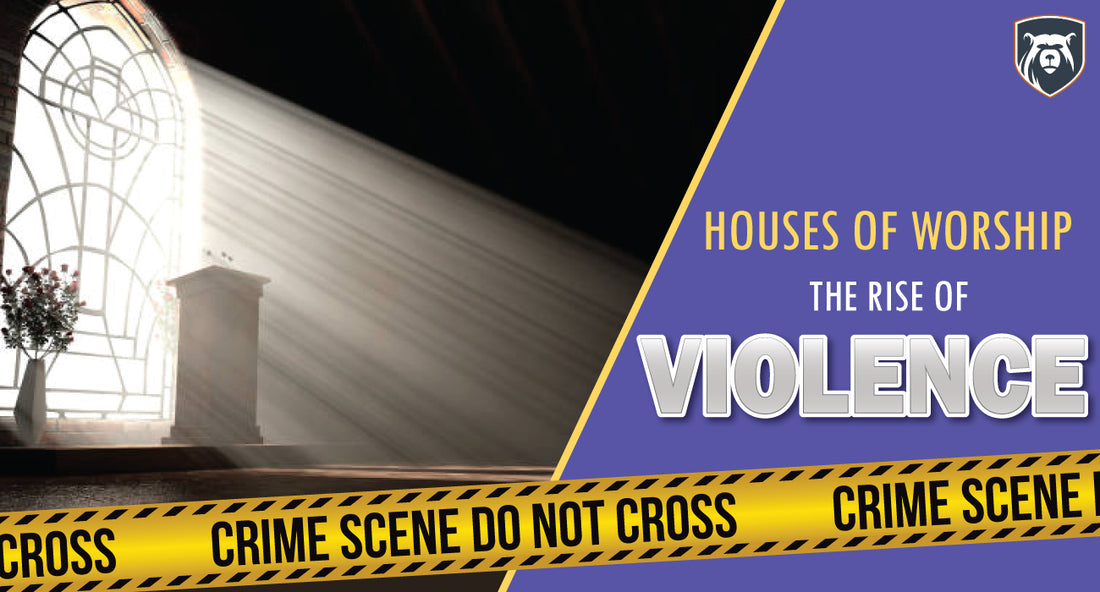The Statistical History of Violence Against Houses of Worship, the Rise of Safety Teams, and Legal Defense by the Right To Bear Association
In recent years, houses of worship around the world have increasingly become targets of violence. This disturbing trend has prompted many religious institutions to establish safety teams to protect their congregations. As these teams take on critical roles in safeguarding their communities, the need for robust legal defense has become evident. Organizations like the Right To Bear Association (RTBA) are stepping up to provide essential support for those who defend these sacred spaces. Understanding the statistical history of violence against houses of worship, the emergence of safety teams, and the legal protections available is crucial for addressing these challenges.
Statistical History of Violence Against Houses of Worship
The statistical history of violence against houses of worship reveals a concerning rise in incidents over recent decades.
1. Historical Context: Historically, attacks on religious institutions were relatively infrequent and often motivated by specific grievances. However, the turn of the 21st century saw a significant shift. The September 11, 2001 attacks and subsequent rise in Islamophobia highlighted vulnerabilities in houses of worship, particularly Islamic centers.
2. Early 2000s to Present: According to the FBI’s Hate Crime Statistics, reported incidents targeting religious institutions have been rising steadily. For instance, in 2019, there were over 1,200 reported hate crimes against houses of worship in the United States. This figure marked a notable increase from previous years and reflects a broader trend of escalating violence.
3. Types of Attacks: The nature of these attacks varies widely, including arson, vandalism, shootings, and bombings. High-profile incidents such as the 2015 Charleston church shooting and the 2018 Tree of Life synagogue shooting have drawn significant attention to the severity of these threats.
4. Geographic and Demographic Patterns: Attacks have been observed globally but are notably concentrated in regions experiencing social or political instability. In the U.S., attacks are often linked to areas with high social tensions. Internationally, countries experiencing sectarian or political conflict also report significant violence against religious sites.
5. Impact on Congregations: The rise in violence has had profound implications for congregational safety and community well-being. Many houses of worship have been forced to rethink their security strategies in response to these growing threats.
The Emergence of Safety Teams
In response to the increased violence, many houses of worship have established safety teams to protect their congregants and manage potential threats. The role and importance of these teams have become increasingly evident:
1. Formation and Function: Safety teams are composed of trained volunteers who focus on various security aspects, including monitoring premises, managing emergencies, and de-escalating conflicts. Their presence aims to prevent incidents before they escalate and to respond effectively when threats arise.
2. Training and Preparation: These teams undergo rigorous training in areas such as emergency response, first aid, and conflict resolution. They also conduct regular drills to ensure preparedness for various scenarios, from medical emergencies to active shooter situations.
3. Community Engagement: Safety teams often work closely with local law enforcement and community organizations to enhance security measures and foster a supportive network. Their role extends beyond immediate protection to include building a culture of awareness and resilience within congregations.
Legal Defense by Right To Bear Association (RTBA)
The rise of safety teams has highlighted the need for legal protection for those who take on the responsibility of defending their congregations. The Right To Bear Association (RTBA) provides critical legal support to safety team members:
1. Legal Defense Fund: RTBA offers a legal defense fund designed to assist safety team members who may face legal challenges after defending themselves or others during an incident. This fund helps cover costs such as attorney fees and court expenses, ensuring that financial barriers do not impede access to justice.
2. Expert Legal Guidance: RTBA connects safety team members with legal experts who specialize in self-defense cases. This expert guidance is essential for navigating the complexities of the legal system and ensuring fair treatment in court.
3. Training and Resources: RTBA provides resources and training to help safety team members understand their legal rights and responsibilities. This preparation is crucial for making informed decisions and acting within legal boundaries during critical incidents.
4. Peace of Mind: Knowing they have legal support allows safety team members to focus on their roles without the constant worry of potential legal repercussions. This support enhances their effectiveness and morale, enabling them to perform their duties with confidence.
Conclusion
The statistical history of violence against houses of worship highlights a troubling rise in targeted attacks, reflecting broader societal and ideological conflicts. In response, the emergence of safety teams within these institutions has become a vital strategy for protecting congregations. However, the role of these volunteers comes with significant legal risks, making robust legal defense essential.
Organizations like the Right To Bear Association play a crucial role in providing legal support to safety team members, ensuring they can defend their communities without facing undue legal burdens. By understanding and addressing these interconnected issues, society can better support houses of worship, enhance security measures, and uphold the principles of justice and safety for all.
By joining the family of Right To Bear Association, you are securing access to the most value centered, cost effective legal defense protection, training, education, discounts with industry partners, newsletter and more. You are also joining a community dedicated to ensuring your peace of mind and protection while fighting for your rights by dedicating financial resources to support the filing of amicus briefs nationwide in support of the 2nd amendment.

